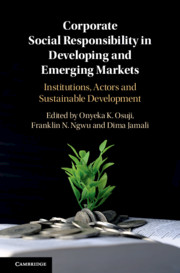 Corporate Social Responsibility in Developing and Emerging Markets
Corporate Social Responsibility in Developing and Emerging Markets Book contents
- Corporate Social Responsibility in Developing and Emerging Markets
- Corporate Social Responsibility in Developing and Emerging Markets
- Copyright page
- Dedication
- Contents
- Figures
- Tables
- Notes on Contributors
- Foreword
- Endorsement
- Preface
- Table of Cases
- Table of Legislation
- 1 Introduction to Corporate Social Responsibility in Developing and Emerging Markets: Institutions, Actors and Sustainable Development
- Part I Institutions, CSR Conceptualizations and Sustainable Development
- 2 Institutional Theory and Corporate Social Responsibility in Developing Countries: a Comparative Institutional Perspective
- 3 CSR and a Capabilities Approach to Development: CSR Laws as an Allocative Device?
- 4 Domestic Adjudicative Institutions, Developing Countries and Sustainable Development: Linkages and Limitations
- 5 The Informal Economy: CSR and Sustainable Development
- 6 Human Resource Management and Political CSR in Global Supply Chains: Causes and Consequences of Host Communities’ Enduring Struggles
- 7 Navigating the CSR Discourse from a Developing Country’s Perspective: a Shift to Human Capital Development?
- Part II CSR and Sustainable Development Cross-Country Studies
- Part III Normative and Utility Perspectives
- References
3 - CSR and a Capabilities Approach to Development: CSR Laws as an Allocative Device?
from Part I - Institutions, CSR Conceptualizations and Sustainable Development
Published online by Cambridge University Press: 18 December 2019
- Corporate Social Responsibility in Developing and Emerging Markets
- Corporate Social Responsibility in Developing and Emerging Markets
- Copyright page
- Dedication
- Contents
- Figures
- Tables
- Notes on Contributors
- Foreword
- Endorsement
- Preface
- Table of Cases
- Table of Legislation
- 1 Introduction to Corporate Social Responsibility in Developing and Emerging Markets: Institutions, Actors and Sustainable Development
- Part I Institutions, CSR Conceptualizations and Sustainable Development
- 2 Institutional Theory and Corporate Social Responsibility in Developing Countries: a Comparative Institutional Perspective
- 3 CSR and a Capabilities Approach to Development: CSR Laws as an Allocative Device?
- 4 Domestic Adjudicative Institutions, Developing Countries and Sustainable Development: Linkages and Limitations
- 5 The Informal Economy: CSR and Sustainable Development
- 6 Human Resource Management and Political CSR in Global Supply Chains: Causes and Consequences of Host Communities’ Enduring Struggles
- 7 Navigating the CSR Discourse from a Developing Country’s Perspective: a Shift to Human Capital Development?
- Part II CSR and Sustainable Development Cross-Country Studies
- Part III Normative and Utility Perspectives
- References
Summary
This chapter examines whether the CSR concept and its emerging legal framework can become an allocative device allocating responsibility for certain aspects of development to business and channelling business conduct on development issues. CSR is a concept which often captures dimensions of the relationship between business and society in context. On the one hand, it covers aspects which focus on the mitigation of corporate impacts on a range of issues including environment, health, labour, human rights and corruption. On the other hand, it also covers the ability of corporations to contribute constructively to societal objectives in the above areas and beyond. Consequently, in a developing country context, CSR could be invariably linked to some development objectives such as optimal health, well-being, education, jobs etc…, because these objectives form the bedrock of capabilities which the individuals in these societies would like to achieve. Sen’s capabilities conception of development permits the consideration of institutions and frameworks including legal mechanisms geared towards human development objectives. Human development objectives also have a bearing on wider sustainable development goals. The chapter examines examples of emerging legal frameworks to reveal the potential and limitations of this perspective, which indicates how CSR can contribute to development.
Keywords
- Type
- Chapter
- Information
- Corporate Social Responsibility in Developing and Emerging MarketsInstitutions, Actors and Sustainable Development, pp. 31 - 48Publisher: Cambridge University PressPrint publication year: 2019
References
- 2
- Cited by
